Building Community in Promise Mascot Agency
Meet the mascots
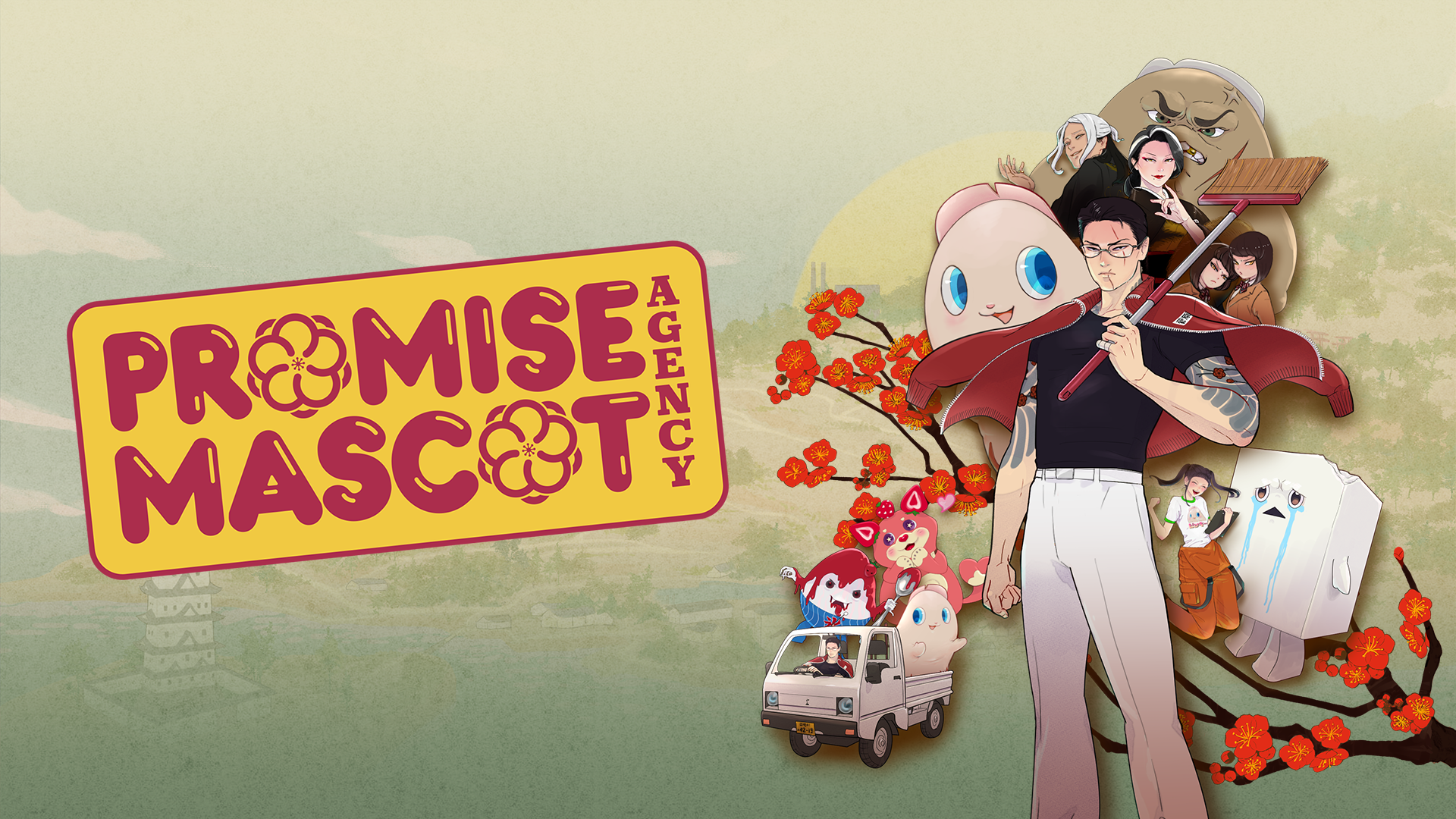
Cute critters have overrun Japan. They've taken over the world, as a matter of fact. In the city where I live, a red bull trots down the stairs of a basketball stadium. I walk into my local grocery store, and a Navy captain sells me sugary cereal. When I visited Mexico City, a jolly and rotund doctor, donning a fashionable mustache, danced excitedly in front of his chain of pharmacies. A blushing black bear in the Kumamoto prefecture stares at me through my computer screen with an uncanny expression and empty eyes.
A mascot is a human in a cute costume, an anthropomorphic creature, a cartoon, or a caricature, and they mark their appearance anywhere consumerism rears its ugly head. They are vessels by which you are sold stuff, for the most part, but said argument is somewhat superficial and ignores mascotry for the intricate cultural practice that it is. The interesting aspect mascots present is what they symbolize. We attach value systems and subjective qualities to these creatures, and these encompass the broad spectrum of what we as humans find charming or important.
Promise Mascot Agency, the newest game by the Paradise Killer developers, Kaizen Game Works, dares to ask: "What if mascots were real?" and with that cheeky question, blurs the lines of what it means to be a member of a multi-faceted community. The game exists on an absurd plane of existence where mascots are living, breathing entities that co-exist with humans, no questions asked.
When I was chasing the dragon in Promise Mascot Agency, I often wondered: is the exploration of its themes as direct as the title suggests? Is this a game about upholding promises and absolving oneself of past sins? Is it about the importance of community-driven policies and materially improving the lives of others? Is it about fighting corruption in a small Japanese town that seems permanently stuck in the Showa era? Well, yes to all of the above, but more so, Promise Mascot Agency is all about the beauty and power of forming community as a bastion for material and political support.
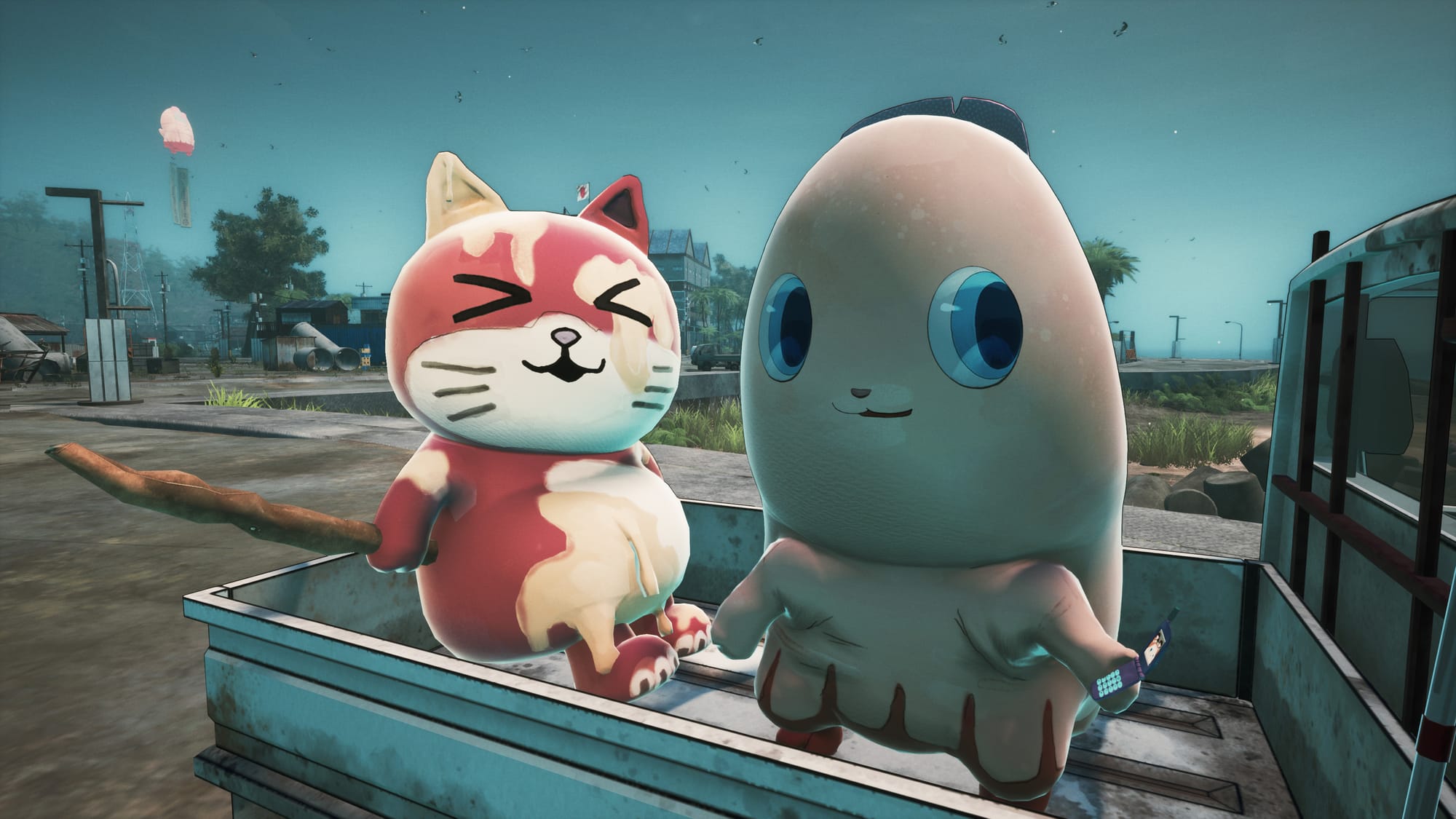
Michizane Sugawara, or Michi, the playable character of Promise Mascot Agency, is a yakuza saint, as canonized by the church of his kyodai in the Like A Dragon series. Similarly to Kiryu Kazuma (with whom he shares a voice actor), he is a legend in the Japanese criminal underworld. He is blessed with his title: "The Janitor", as he is adept at sweeping away the messes that dirty up his family.
He shares a similar moral outlook to his Sega peers. Strong as a bull - in one of his first scenes, he is seen easily brushing off multiple thugs with one sweep of his trusty broom - but he always tries to use his strength for good. He sees his crime syndicate as a family, the matriarch as his own Beata Maria, and he would gladly die defending those he loves.
He refuses to use lethal violence, is solemn in his duties, and is always willing to lend an ear to strangers and even assist them with their issues in non-violent ways. From the get-go, he is not an individualistic man; he is empathetic, caring, and focused on helping others regardless of what he must sacrifice. He has already been a pillar of one community, albeit one based on criminality.
After a rightful cock-up that resulted in billions of lost yen, Michi's family fakes his death and forces him to move to the sleepy cursed town of Kaso-Machi to run a mascot agency in a legitimate and law-abiding way. While gathering performers and customers, Michi is soon embroiled in the problems of the town – a corrupt mayor, an impoverished population, a mysterious curse that slowly kills all male Yakuza members that set foot into town, and a catastrophic mistake his own crime family tried to cover up.
The comparison to RGG's Yakuza series is an apt one to make, and not just because Takaya Kuroda is in the game. While mechanically different games, Promise Mascot Agency shares the same ethos of combining melodramatic tones with serious crime plots alongside a dash of cartoonish humor and exuberance. Like A Dragon does a wonderful job at humanizing criminals, who in the world of video games are often relegated to the roles of unnamed thugs with little nuance, in the same way Promise Mascot Agency succeeds at characterizing its mascots.
This is clear from the moment you meet Pinky☆ (and out of respect for her, you should type her name out with the star at the end).
After Michizane cuts off his own pinky in penance, he meets a severed finger in return. Pinky☆ initially runs the Love Hotel that will quickly transform into a quality mascot agency under the gangster's guidance. She is initially brash, immature, and has an unhealthy obsession with murder and torture, which has to be, ironically, quelled by a former killer. It does not take long for her to reveal the depths of her character.
Pinky☆ is your ride or die (literally, as she is always present in the bed of your indestructible pickup truck). From the get-go, she is a boon for the agency – knowledgeable, helpful, and secretly soft-hearted. A known ne'er-do-well in the town, her unique charm and no-bullshit approach are endearing qualities the local populace can't resist – she is somehow an expert at making amends and repairing her injured relationship with the townsfolk.
She is still prone to anger in the endgame, but it's easy to empathize. Pinky☆ is a child of loneliness. Abandoned by her father, shunned by her peers, she still has the capacity for love and cares deeply about her hometown. It's clear she is a mascot who doesn't let her past shape her moral attitudes in the present. She becomes not just an invaluable ally in the race to overthrow the selfish mayor, but a good friend and confidant to Michi.
As with all the mascots you will gather in your retinue, you will find complexity under the surface layer of their personality and looks. You will find humanity and community under the costume of mascotry.
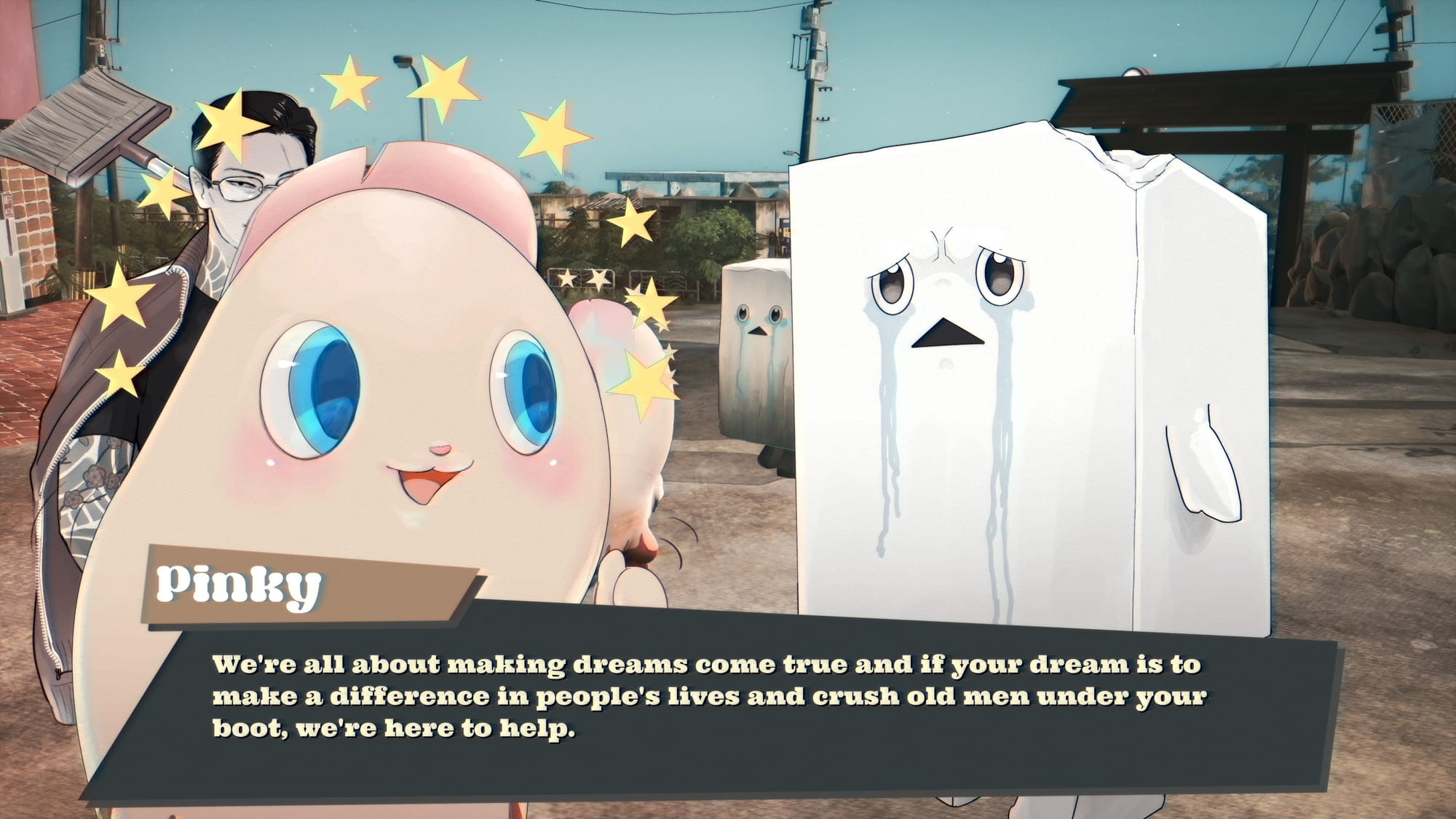
My biggest fear going into Promise Mascot Agency was that, given the large cast, some characters would have less development than their peers. Luckily, even though some of the latter mascots do suffer from superficial characteristics, I was always pleasantly surprised by the unique motivations and flaws of each one.
As you run your agency for profit and send your labor force of critters to promotional events, you interact with your employees after-hours in "Life Satisfaction" events. These are the emotionally exploratory segments of the game, which always offered candid moments that allowed me to learn more about the mascots, fomenting empathy with each line of dialogue.
A permanently crying block of tofu wants to be seen as tough, a salary-cat decides corporate life just isn't for him, a delicious egg can't afford the mortgage of the inn he calls home, a ghost wants others to care about cemetery maintenance, and a yam-covered cat just wants to read hentai. All were relatable and, dare I say, "human" problems and feelings.
One of my favorite aspects of Promise Mascot Agency is that, despite its cute and cuddly veneer, it does not shy away from talking about hardship and unsavory human emotions.
All characters are reckoning with something – either an internal flaw they're trying to process, some tangible material struggle, a difficult past, or a promise that needs to be kept. None of them reach their goals or resolve their problems as individuals. Michi, Pinky☆, and the rest of the crew at the agency are ready to help, without sacrificing the self-determination of those they assist.
The game showcases the community for what it is; not a clique, nor a group gathered out of shallow mutual interest. It is a group of people that aren't alike, might not even see eye-to-eye on all issues, but all support and assist each other however possible. They learn to forgive and understand the enemy isn't each other, but the man in the high chair.
The community Michi and Pinky☆ form is a mascot-human alliance of sexual deviants and political agitators coming together into a chosen family, to improve the material conditions of a town haunted not by ghosts and curses, but by capitalism and government corruption.
Michi and Pinky☆ repeat an adage throughout their journey – that they are here to help the townsfolk accomplish their dreams, big or mundane as they may be. The ethos bleeds into their business acumen, not just in the aforementioned care for their employees' wellbeing and job satisfaction, but in a permanent attempt to reach a compromise with the mascots and humans, and in a continuous and dedicated effort to bankroll literal infrastructural improvements for Kaso-Machi.
This all happens with the goal of increasing the quality of life for all – accomplishing the task by knowing when to stick it to the man and rally together for the town's rights against corrupt government forces, and when to knock down signposts adorned with the mayor's smug, stupid grin.
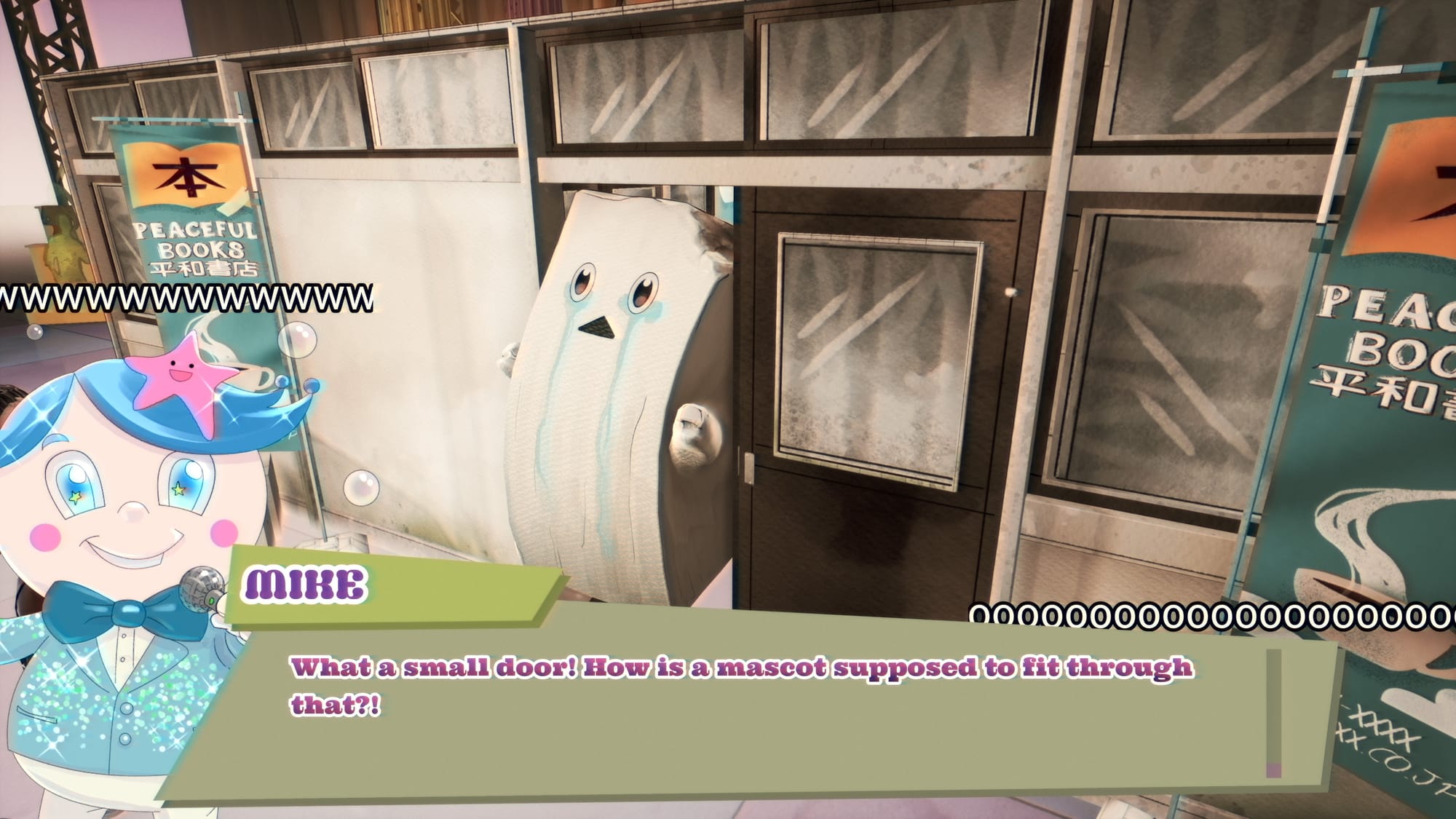
As a child of culture theory, I pondered the "role" of a mascot in this strange society. "Mascots risk their life to delight and entertain", but mascots are not railroaded into the job role of advertising entities. A black crow tends to his shrine, a kappa just wants to collect and play video games – neither of them want any part in the entertainment industry. Mascots, like humans, have complex motivations and goals.
I mentioned earlier that community is a continuous exercise of compromise – each individual's wants and needs must be analyzed and considered if the whole community wants to flourish. Michi and Pinky☆ welcome everyone with open arms and take everyone at face value – they enter into dialogue to allow them on the path of self-actualization through the help of peers, whether they want to join the agency or not.
This continuous dialogue of compromise is mechanically represented – when first hiring any mascot, you can grant them an extra share of the profit, big buck bonuses, and the rare and holy (Un)Paid Time Off.
But, in a more meta-structural way, the whole game is an exercise in building support networks with your neighbors, which necessitates, at a certain point, a compromise between parties. Note that this compromise is with each other as members of a community, not a compromise with the oppressors. We're not cutting a deal with the mascot-hating mayor.
Speaking of: he's probably the only character that shows some form of bigotry towards the mascots. I thought the game would make some sort of social commentary with the explicit differentiation of the human and the mascots, but I found no such thing – the "othering" of the mascots as "non-human" is superficial, which in turn, adds to the surrealism of the situation.
Mascots in Promise Agency are the go-to for the kind of gigs real-world mascots work, but, like us humans, a mascot can be whatever they want to be. They just exist in the world, and navigate through life the same way humans do, with the same personal or structural worries, the same thoughts, desires, and flaws.
The lines between human and mascot are blurred. Some of the humans in Kaso-Machi are capable of quirkiness at levels that may even exceed those of the mascots. The friendly barkeep might as well be the mascot for sexual freedom as she's dressed head to toe in swanky latex. I see no difference between the Power-Rangers-looking Captain Sign and the rest of the mascots outside of the fact that he does not work to draw in customers to a business – his job is promoting road safety and being a "hero" for mascots.
Perhaps therein lies the biggest differentiation: most humans do not partake in Mascot Events directly, but are relegated to your deck in the card-battler side of the game. This is how the it mechanically represents their integration with the agency and with the broader community – they are there to assist mascots with problems so banal they border on comical. Mascot stuck on a door? Clumsily knocked down a stack of boxes? Just call on the heroes to assist, call on your community to help out.
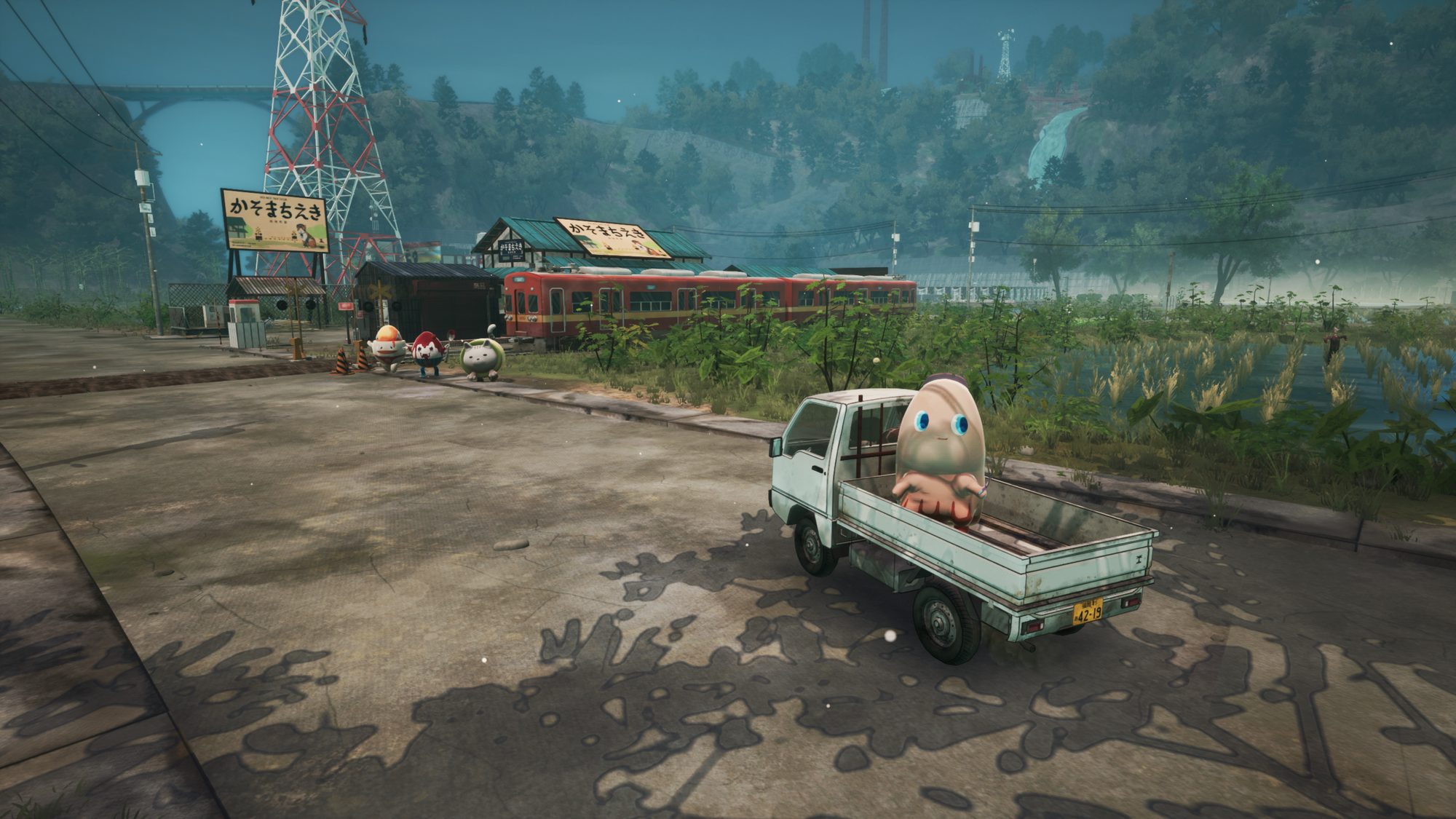
With the player's attempts at creating and fostering community, you can actively visualize the changes your actions produce in the town. Kaso-Machi is initially weary, shrouded in fog, and dirty. With each player action, light and joy are let into the town, allowing it to flourish into a colorful and beautiful place.
The message the game left me with is ultimately life-affirming – that a collective of oddballs, losers, and degenerates can form a cohesive organization dedicated to the betterment of their community. This game is punk in attitude yet cozy and chill in its charm.
Promise Mascot Agency is an unforgettable road trip. It's a captivating open world where everything you collect and upgrade feeds into its business simulator side. As a business sim game, it erodes the promise of profit and replaces it with the hope of community action and mutual aid. It's a necessary message to absorb, especially in the current age of political calamity that is continuously grifting loners and pushing them to the right of the political spectrum.
It's a game in defiance against the idea of individual exceptionalism – that the only way we can pull ourselves up from our pits of personal or political despair is by helping each other.
My advice to new players is to just enjoy the ride. You might learn something new about yourself and others. Maybe you'll ponder the importance of finding peers with common interests and political goals, which is an insane statement to make in an essay on a videogame about managing a silly mascot agency, and thank God for that! Thank God for Pinky☆, the mascots, and Kaizen Game Works, for reminding me not only of what's most important in this world, but that video games are actually a positive force in this world.
